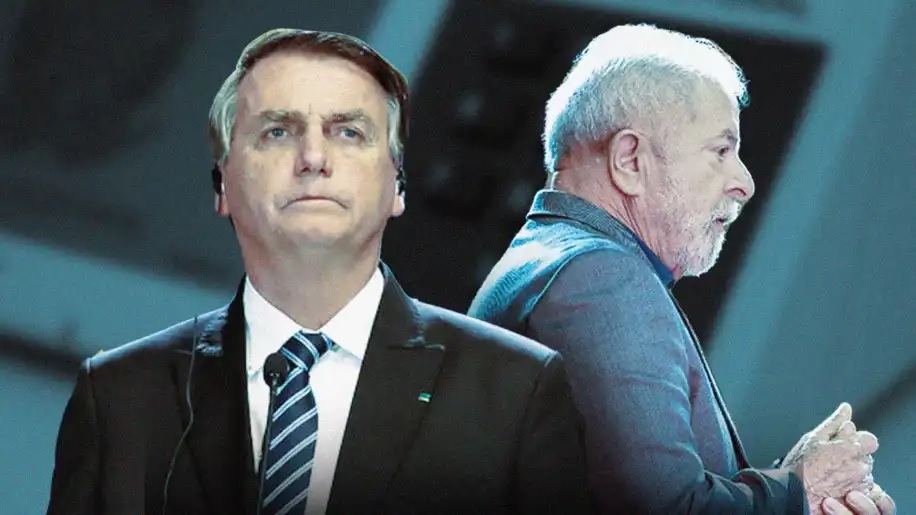Elections will be held in Brazil on Oct. 2, 2022.
Some 148 million eligible voters will elect the president and vice president (presidential election), the senators and deputies of the National Congress (legislative elections), the governors and vice governors of the states (gubernatorial elections), and the deputies of the state legislative assemblies as part of the legislative elections in simultaneous elections.
With the upcoming ballot increasingly resembling a World Cup final due to its polarization, the first and second rounds are now becoming scenarios that could change the outcome depending on strategy.
Like a soccer match, incumbent President Jair Messias Bolsonaro and his main rival Luiz Inácio “Lula” da Silva fear the penalty shootout, i.e., the second round, but for different reasons.

While the latest Datafolha poll released Thursday, Sept. 22, sees Lula da Silva at 47% of voting intentions and Bolsonaro stagnating at 33%, the Workers’ Party (PT, left) fears that anything could happen in these 28 days.
That tempers could heat up, political violence could escalate, the electoral process could be threatened, and da Silva himself could make a false move.
In short, it is feared that any advantage accumulated by Lula da Silva could be lost in favor of Bolsonaro.
The former president has even sent a letter to Pope Francis, to be delivered in the next few days by PT Senator Eduardo Suplicy.
Da Silva calls the Pope a “dear friend” and thanks him for the letter he received during his detention in Curitiba, but also warns him that the second round is “a risk” and that “in case of victory, it will be necessary to guarantee our investiture.”
However, according to the international consulting firm “Eurasia Group,” the risk of a coup d’état is exaggerated because power in Brazil is not centralized in the executive branch and the armed forces have no interest in taking a position of rupture with the institutions.
Last year, Vice President and General Hamilton Mourão calmed tempers by saying that even if the proposal for a printed ballot (in addition to the current electronic powered) were not approved, no one would prevent the elections because “Brazil is not a banana republic.”
The critical issue for a possible runoff remains the so-called dispersion of electoral polls, which often show very different margins between candidates, fueling expectations on both sides.
It could exacerbate the disappointment of the pro-Bolsonaro camp in the event of a victory for Lula da Silva in the first round and generate allegations of fraud with a possible scenario of protests and even clashes.
In an interview with the Brazilian television channel “SBT” a few days ago, the Brazilian president said that if he did not win the first round with more than 60% of the vote, “something unusual” must have happened at the Superior Electoral Court (TSE), raising the specter of fraud.
For its part, the Brazilian left fears abstentionism, especially in the suburbs, where da Silva has a good voter base.
Voting in Brazil is a right and a duty: Brazilian citizens between 18 and 70 are obliged to cast their vote.
Young people aged 16 and over and older people aged 70 and over are free to vote.
Despite this, 20% of Brazilians abstained from voting in the 2018 elections, which is already higher than in previous years.
In February, the TSE registered the lowest number of new voters, just over 830,000, compared to 1.4 million in the same period in 2018.
A TSE campaign on social media called “Rolê das Eleições” (The Role of the Elections) resulted in 96,425 16- and 17-year-olds registering to vote for the first time in their lives within a week.
The “PT” tried to increase voter turnout with campaigns to attract young people featuring Brazilian artists like singer Anitta and even Hollywood stars like Mark Ruffalo and Leonardo DiCaprio.
“Brazil is home to the Amazon and other ecosystems important for climate change. What happens there affects us all, and your vote is crucial for a healthy planet,” DiCaprio had written in April in a tweet that infuriated Bolsonaro.
“It’s better if DiCaprio shuts up instead of talking nonsense,” the president had commented.
The campaign had its effect, however, and in May, the “TSE” announced that 2.04 million new voters had been registered by that time.
The fear, however, is that the effect of a tweet will not last long enough to encourage young people to vote in the second round.
To win in the first round, Lula da Silva is also looking for the so-called “useful” votes, meaning he is trying to win votes that would otherwise go to other candidates.
Da Silva’s main target is Ciro Gomes of the Democratic Workers Party, who is in third place in the polls with 7% of the vote and who did not like the PT candidate’s move.
“What does right-wing fascism and left-wing fascism do in Brazil,” Ciro said in an interview with the daily Estado de São Paulo, “because there is left-wing fascism in Brazil, led by the PT, that wants to simplify the debate theatrically and destroy any alternative. It is a tragedy for Brazil.”
For Gomes to support Lula da Silva and even renounce his candidacy, several Latin American leftists from Venezuela to Bolivia spoke out with an open letter, including former President of Ecuador Rafael Correa and Nobel Peace Prize winner Adolfo Pérez Esquivel of Argentina.
“You will not be able to do any good despite your intentions,” the letter reads, “because your chances of winning are zero. You still have time to make amends, Comrade Ciro”.

